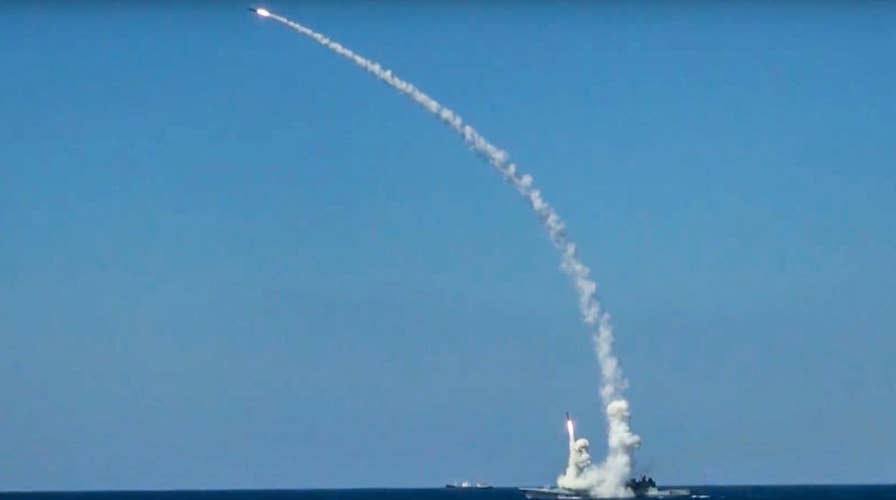Russia launches cruise missiles at ISIS targets in Syria
Missiles fired from vessels in the Mediterranean Sea targeted command centers and ammunitions stockpiles; Conor Powell reports from Mideast bureau
MOSCOW – Russia has fired cruise missiles from the Mediterranean Sea on positions of the Islamic State group in Syria, the Defense Ministry said on Friday, Moscow's latest show of strength in the conflict wracking the Mideast country.
The ministry said in a statement that two frigates and a submarine launched six cruise missiles on IS installations in Syria's Hama province, destroying command centers and ammunition depots. It did not say when the missiles were launched.
Moscow has fired missiles from the Mediterranean at militants' positions in Syria before, including launches from a submarine and a frigate in May at the targets in the area of the ancient city of Palmyra.
Russia is one of the strongest backers of Syrian President Bashar Assad's government and has been carrying airstrikes in the country since September 2015.
Separately on Friday, a senior Russian lawmaker said Moscow is "nearly 100 percent" sure that the IS top leader was killed in a Russian airstrike last month.
The Defense Ministry first made the claim last week, saying that Abu Bakr al-Baghdadi's death in the May 28 strike on the outskirts of the Syrian city of Raqqa was still "being verified through various channels."
Viktor Ozerov, head of the defense and security committee at the upper chamber of the Russian parliament, told the Interfax news agency on Friday that Russia's intelligence about al-Baghdadi's death is "nearly 100 percent" certain.
"Russia would not want to be on the list of the countries that have said before that he was killed and then al-Baghdadi would resurrect," Ozerov added.
The whereabouts of the shadowy al-Baghdadi, with a $25 million U.S. bounty on his head, have not been known. His last public appearance was almost three years ago in the Iraqi city of Mosul, at the 12th century al-Nuri Mosque from where he declared a "caliphate" in the territory that IS had seized in Iraq and Syria in July 2014.
That mosque, along with its famous leaning minaret, was destroyed on Wednesday night, blown up by IS militants as their control of Mosul increasingly is slipping away. The mosque would have been a symbolic prize for Iraqi forces and the U.S.-led coalition in the fight for Iraq's second-largest city.
Meanwhile, Turkish President Recep Tayyip Erdogan warned that his country would launch a new incursion into northern Syria to counter any threats from U.S.-backed Syrian Kurdish fighters who are engaged in a battle to capture the IS stronghold of Raqqa.
Turkey says Syrian Kurdish fighters are an extension of an insurgent Kurdish terror group operating in Turkey. Ankara is angered by a U.S. decision to launch the Raqqa offensive in partnership with the Kurdish-led Syrian Democratic Forces. It has warned against Syrian Kurdish groups becoming entrenched in the region.
"If the developments in Syria pose a threat, if we're faced with such an event, the whole world should know this: we'll do there what we did during (Operation) Euphrates Shield," Erdogan said, addressing Syrian refugees during a Ramadan fast-breaking dinner near the border with Syria. He was referring to a Turkish military intervention launched last year to help Syrian opposition forces drive out IS militants from a border area and to curb advances by Syrian Kurdish fighters.
Earlier, Erdogan also said Turkey would never allow the creation of a separate Kurdish entity in northern Syria.
"You should know that the Turkish state, with its armed forces and all other means, will never allow the creation of a state in northern Syria," he said.
___
Associated Press writer Suzan Fraser in Ankara, Turkey contributed to this report.





















